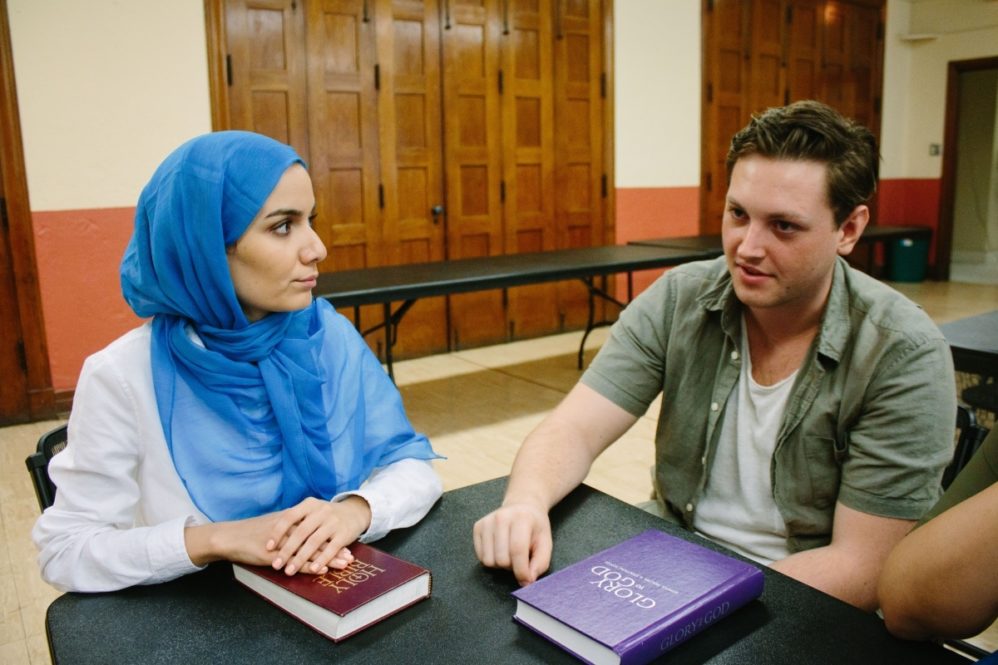Tool
Guiding Questions for Implementing Interfaith Assessment
This resource outlines six key assessment tenets along with a set of questions to help guide your assessment practices.

Within the changing landscape of higher education, faculty, staff, and administrators are encountering an increasingly diverse student population, including students who represent a wide range of religious and secular identities. Campuses are increasing support for students of diverse worldviews and fostering students’ ability to engage with others across lines of worldview difference. As campus partners engage in this endeavor, assessing interfaith work is critical for understanding progress.
This resource provides an overview of IFYC’s approach to assessment, outlining six key assessment tenets along with a set of questions to help guide your assessment practices. As you read through the resource we invite you to pause and reflect on the self-reflexive and/or program questions. These questions are designed to help you connect our approach to the interfaith work you are (or will be) assessing on your campus.
Defining Assessment
Before diving into our assessment approach, it is important to define assessment. Assessment is the systematic collection of information about programs, departments, and institutions using time, knowledge, expertise, and resources available for the purpose of improving learning and development. The six tenets that follow unpack IFYC’s definition of assessment and highlight positive outcomes associated with assessment and interfaith work. The definition and the tenets are not exhaustive; they are a starting point for you to begin thinking about the value and practice of interfaith assessment.
1. Assessment promotes learning and development
First and foremost, assessment should always be done in service toward learning and growth, particularly for your students. In service of interfaith education, assessment tools can be creatively embedded into experiences to serve dual purposes of learning and evaluation. Assessment should be used to improve student learning in the curriculum and co-curriculum. Assessment can also help students develop into civic-minded citizens that embrace pluralism and engage in interfaith cooperation.
- Self-Reflexive Question: In what ways do I approach assessment? Is it with a lens toward student learning and development?
- Program Question: How do the assessment tools I use help me understand student learning and growth?
2. Assessment builds inclusive interfaith communities
Assessment is a powerful tool for maximizing student development and community building; it helps educators understand how services and experiences promote growth and bridge community divides. Instead of asking the question “how can we measure community,”2 we encourage campuses to strive to answer the deeper question “how can we build community?” By asking the deeper question, we inevitably create assessments in service to the larger task. Assessment can and should be used in service of building an inclusive interfaith community.
- Self-Reflexive Question: What are the ways I can use assessment to help expand my vision for what our campus community should look like?
- Program Question: In what ways do my interfaith assessment practices help to create a more inclusive community?
3. Assessment uses evidence to create change
As educators in higher education, it is our responsibility to design and implement meaningful experiences that foster deeper understanding of one’s religious, spiritual, ethical, and/or moral identity in community with others of different perspectives. Assessment affords us the opportunity to understand our impact as educators, mentors, guides, and companions using a variety of forms of data and feedback. Even when feedback through assessment does not align with what we expect or hope to see, it is critical to understand these findings as valuable pieces of information to enhance and advance interfaith work.
- Self-Reflexive Question: At which points in the decision-making process do I consider assessment information?
- Program Questions: How do our assessments capture the deep learning and developmental experiences students encounter through our programming? In what ways will I apply findings from assessments to improve programs?

4. Assessment is more than surveys
Campus communities are composed of religiously diverse students, staff, and faculty and diverse forms of assessment information provide a more meaningful and vivid picture of the engagement happening on campuses. Too often, assessment is solely associated with tracking numbers and administering surveys. Although those tools are valuable pieces of the larger assessment picture, it is crucial to value a multitude of data sources that validate and celebrate other ways of knowing, being, and doing in our communities. We contend that no form of data is inherently “objective” or “perfect” and that any information collected for assessment purposes has limitations.
- Self-Reflexive Question: What assessment tools am I most comfortable with?
- Program Questions: Historically, what assessment tools have I used to collect information about programs? What assessment practice will best answer the questions I have about student learning because of my programs?
5. Assessment is feasible
Our approach embraces information that, when collected with integrity, provides indicators of progress; we are in search of the good, not perfection. Campus partners should utilize proven assessment practices advocated by the field while exploring other techniques that can consider the complexities of interfaith engagement. Thus, assessment should be feasible for a range of individuals and entities.
We all bring different gifts to the table, and we all are capable of doing good assessment. It is important to recognize the human, physical, technological, and financial resources at hand, employ assessment strategies that can be developed and reasonably completed. Campus educators have the responsibility to be self-aware of their skillsets and knowledge, as well as the possible gaps within those areas. Thus, educators should take ownership for creating practical assessment and recognize that even incremental steps can help improve our ability to understand student learning.
- Self-Reflexive Questions: What are my strengths and talents as it relates to interfaith assessment? What tools do I have available? How do I already collect or have access to information that could be used for assessment?
- Program Question: What interfaith program can I assess immediately based on the resources and skills I have available?

Conclusion
Assessment has the power to revitalize and reinforce interfaith cooperation efforts when carefully considered and effectively implemented. When used in the service of student growth and development, we not only capitalize on individual learning but also promote a stronger and healthier campus community.